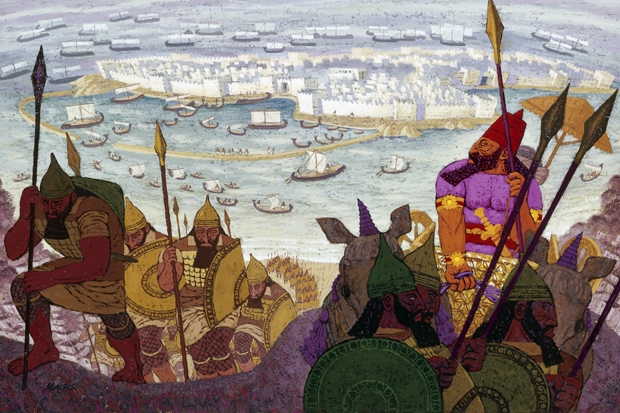The marvellous tales of the title are not just confined to the contents of this book, for the travels and travails of the lone manuscript in which they were inscribed are also something of a wonder, and deserve to be told.
The original collection appears to have been composed in the 10th century, and it is easy to imagine some of these stories doing the rounds of Cairo, Baghdad and Damascus while the crusaders were making trouble in the neighbourhood. This particular version of the stories was written down in the 14th century, probably in Cairo, for that is where the manuscript can be traced. In 1517 when the Renaissance was in full flood, the Ottoman Sultan Selim — ‘the Grim’ — watched the crucifixion of the last of the Mamluk rulers of Egypt at one of Cairo’s great gates. Among the treasures that Selim took home to Istanbul was the only manuscript of this cycle of stories. The manuscript was housed in the library of Hagia Sophia, and was then forgotten.
In 1933 a German scholar, Hellmut Ritter, came across the tales and translated them into German, and an Arabic edition appeared in 1956. But it wasn’t until the 1990s that the British Arabist Robert Irwin heard about the stories and recognised their immense significance; for these tales, which pre-date The Thousand and One Nights, are the earliest known stories in Arabic literature. Irwin has likened this to discovering a lost Shakespeare play or more Canterbury Tales. At his suggestion, they have finally been translated into English and the tales they tell are even more fabulous and unlikely than that of the story of the lost manuscript.
The Thousand and One Nights is a cycle of individual stories held together by a framing narrative. In it, Sheherazade saves her life by keeping the sultan enthralled each night by her stories. Tales of the Marvellous and News of the Strange may have had its own unifying device, but if so it has been lost, along with the original title and 24 of its chapters. The 18 chapters that have survived contain 26 stories, which were probably intended to be spoken aloud rather than read. It is easy to imagine them as part of the repertoire of a hakawati, a public storyteller like the one who performed regularly at the Nofara café, behind the Umayyad Mosque in Damascus, at least until the start of the current conflict.
What holds them together is an acceptance of a world — ruled over by a God who ‘knows better’ — that is at once savage and filled with wonders. Take, for instance, ‘The Story of Mahliya and Mauhub and the White-Footed Gazelle’. The rest of the title assures us that, ‘It contains Strange and Marvellous Things’ and that is no exaggeration. It charts the painful courtship of two lovers: Mauhub, suckled by a lioness, is a descendant of Nebuchadnezzar; Mahliya is the daughter of the King of Egypt. Their path is strewn with difficulties created by demons and sorcerers, their religion is confused (they appear to be Christian but also to worship the pagan god Baal) and their palaces contain many wonders among which are automata, including a gazelle with fawns made of carnelian and stuffed with money.
Mauhab, who suffers more, is variously wrecked, tricked, deceived, reduced to poverty and turned into a crocodile, although that is nothing compared to the fate of his followers, who are killed by buffaloes with reinforced horns, drowned at sea in a storm conjured by evil spirits or, in the case of his personal messenger, crucified by the princess he loves.
None of these details gives the story away, for it is one of such intricacy, of so many twists and turns, that only the all-seeing One Who Knows Better could guess what might happen in the end. And that, to a certain extent, is the point. The stories are entertainments, but they also contain instructions on how to behave in the world. The narrator of this one, a Christian hermit, informs the seventh-century Arab conqueror ‘Amr ibn al-’As at the beginning that the tale ‘contains lessons for those who will learn and prompts thought’.
Some of the content, with its savage justice of beheadings and crucifixions, is more likely to excite Isis fighters than British readers. There is no shortage of misogyny: several stories present women as either overwhelmed by lust for men or the victims of rape. There is racism: blacks are seen as the bringers of trouble while whites (the paler the better) tend to bring good things to the stories.
And other parts seem straight out of a panto, with a jinni, living up to the typecasting in Aladdin, being able to move through time and space, and to create things out of a puff of smoke — which seems appropriate, as jinn were created out of smokeless fire, according to the Qu’ran. Along with the marvellous there is also the historic: Haroun al-Rashid, the eighth-century Abbasid caliph of Baghdad, who appears in The Thousand and One Nights, also appears here, as does his vizier Jafar.
The publication of Tales of the Marvellous and News of the Strange is an event of immense significance; but don’t read it for that. Rather, read it for the enlightenment to be found in Robert Irwin’s masterful introduction, for the joy of Malcolm C. Lyons’s brilliant translation, for the pleasure of holding in your hand a beautifully made book and, above all, for the pleasure and surprises of its wonder-filled stories.






Comments